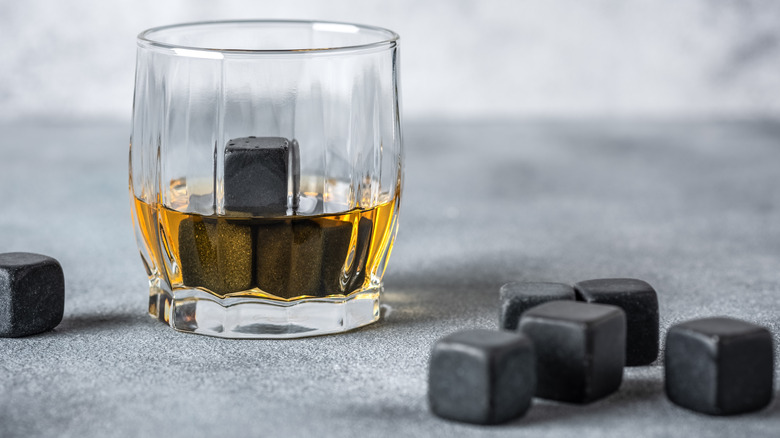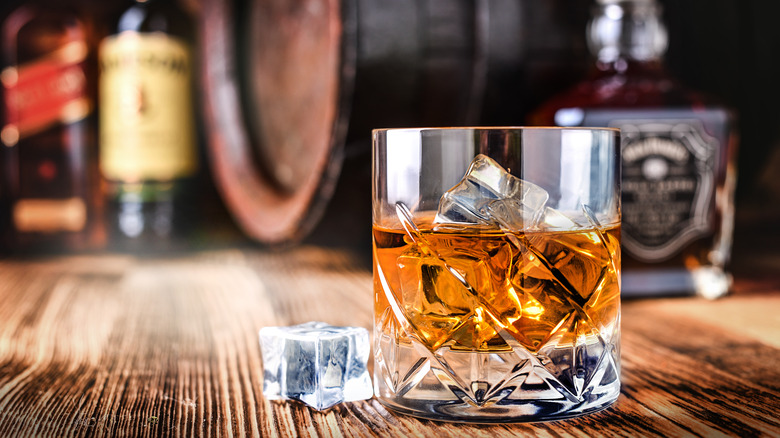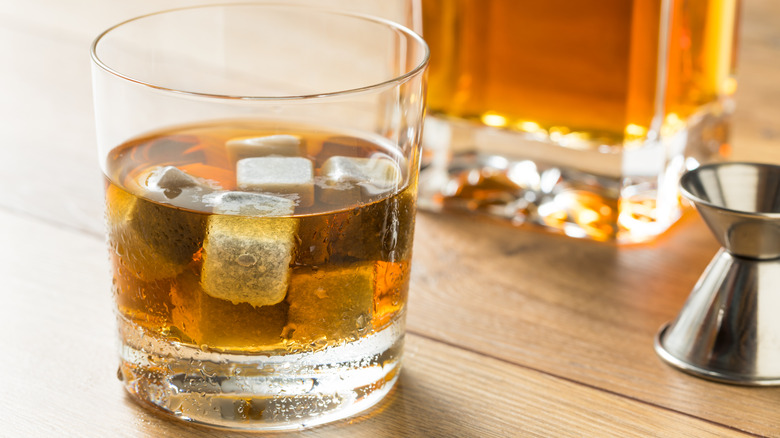When To Invest In Whiskey Stones And When To Leave Them Alone
You might prefer to drink whiskey neat, with a bit of water, or on the rocks. But what about when the rocks in your glass are not made of ice, but are actual stones? Whiskey stones, that is.
Designed specifically to chill the drink without diluting it, whiskey stones have become increasingly popular over the past decade, and are often seen as a practical gift for the whiskey-lover in your life. But how do they work, and are they worth the investment? Usually made from soapstone, marble, granite, or stainless steel, whiskey stones come in a variety of different shapes and sizes. They are stored in the freezer, with the idea being that you add the frozen stones to your glass of whiskey so that they absorb the heat and chill your drink to the required temperature.
Unlike ice, whiskey stones won't melt, so they won't dilute the drink with water, and therefore shouldn't alter the flavor. Although this is not necessarily the case, since some believe that stainless steel stones can add an undesirable metallic taste, while others find that stones can absorb flavors depending on what they're stored with in the freezer; for this reason, they do need to be cleaned regularly. But, when it comes to considering the supposed benefit that whiskey stones avoid melting and diluting your drink, that really comes down to how you prefer your whiskey.
Are whiskey stones better than ice at chilling your drink?
The main reason for adding ice or whiskey stones to a drink is for those times when you'd rather drink a glass of whiskey that's been chilled, rather than at room temperature. But, even though they have the same purpose, whiskey stones and ice cubes work in different ways to cool down a drink. While both chill the beverage by absorbing the heat from the whiskey in the drinking glass, the whiskey stones retain the heat, but it's eventually released back into the drink over a span of time; on the other hand, ice releases the heat as it melts. So are the two methods equally effective?
Some experiments have found that, while whiskey stones worked well at chilling a drink quickly, the effect did not last as long as with ice. When both were used to chill the glass to around 55 degrees Fahrenheit, after 20 minutes, the spirit with a single ice cube had reached 49.5 degrees Fahrenheit; on the other hand, the glass with three whiskey stones had risen in temperature to 63.7 degrees Fahrenheit.
Experts believe the optimum temperature for drinking whiskey is between 60 and 65 degrees Fahrenheit. So, if you prefer your drink less cold as you savor it, then whiskey stones could be the right choice. But if you'd like it to be cooler, then nothing is as cold as ice.
Whiskey stones don't dilute drinks – but is that a good thing?
Some whiskey purists will maintain that ice can dilute the flavors of a good whiskey, while other fans would argue that a single cube, or a drop of water, can help to 'open up' the drink and allow its complexity to be fully appreciated. While science says that there is a perfect amount of water to add to whiskey, you may have less control of the situation when using ice, depending on how much there is and how quickly it melts.
If you prefer ice in your drink, a single, large cube is one solution, since it will chill the whiskey without diluting it too much, thanks to its greater surface area. Because whiskey stones don't add any water at all, when using them you're guaranteed that straight-from-the-bottle taste, albeit cooler than room temperature.
But essentially, it all comes down to personal preference. When making the choice between ice, water, whiskey stones, or nothing at all, it's all about how you like to take your drink. For some, whiskey stones are a vital tool for appreciating a decent whiskey, offering the ability to drink it at a cool temperature, but without it being diluted in an uncontrolled way. For others, given the fact that the stones can add an unwanted metallic or freezer-absorbed flavor, require regular cleaning, don't chill the drink as effectively as ice, and can even clash into your teeth as you drink, they're simply an abomination.



